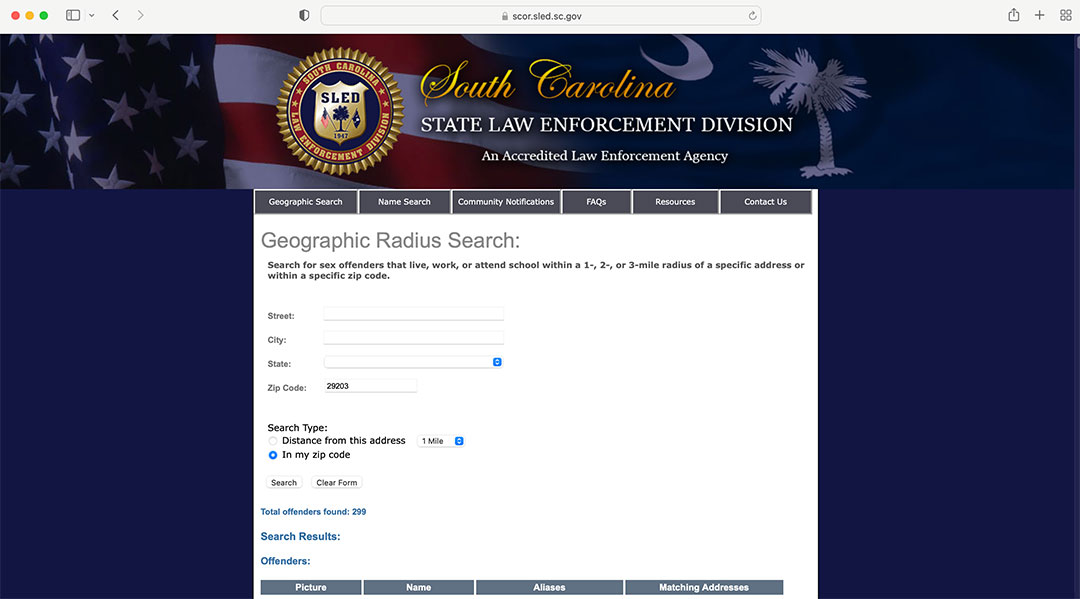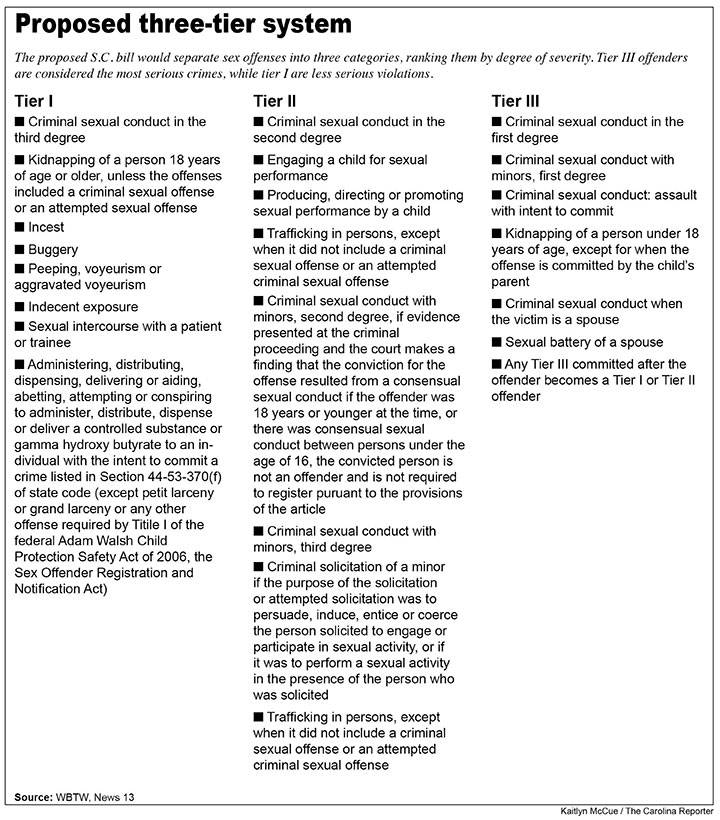The South Carolina State Law Enforcement Division website allows the search of all registered sex offenders throughout the state, up to a three mile radius of any given location. If this bill is passed, many registered offenders will no longer be found online.
South Carolina lawmakers have until June 9 to update state sex offender laws or risk the possibility that thousands of sex offenders will be able to petition to be removed from the state registry.
“We’ve got a hard deadline coming up this summer that we have to get the bill passed, or it’s really going to throw the whole system into chaos,” said Sen. Greg Hembree, R-Horry, the primary sponsor of the proposed legislation. The legislation, which has bipartisan support, was discussed and carried over by the Senate Judiciary Committee Tuesday. A committee vote is yet to be scheduled.
Under current state law, any person who is convicted of a sexual offense, who isn’t found not guilty by reason of insanity, must remain on the registry for the remainder of their life. Registered sex offenders can only be removed from the registry if their plea or conviction is overturned, reversed, or vacated on appeal.
The S.C. Supreme Court ruled last year that requiring sex offenders to register for life on a statewide sex offender registry violated an offenders’ constitutional rights. The petitioner, Dennis Powell, Jr, of Columbia, was imprisoned for two years and on the registry for life after conviction on solicitation of a minor. Powell sent graphic photos to an undercover officer, who was posing as a 12-year-old girl.
Powell challenged the legality of the lifetime registry and online publication of his sex offender status, for life, to the Supreme Court. He won the case with a unanimous court ruling that lifetime status and publication violated Powell’s right to due process and equal protection.
The court held that lifetime registry was unconstitutional because there was no opportunity for offenders to petition or be assessed by a judge for risk of re-offending.
“Being on the registry, you have a criminal conviction; you can’t just get on there by accident,” said Hembree.
Adam Whitsett, general council for the State Law Enforcement Division, says that there are roughly 11,000 South Carolina felons on the sex offender registry and an additional 6,000 who were convicted elsewhere but are now residing in the state. Without legislative action, all offenders could petition to have their names removed from the registry, Hembree said.
According to South Carolina Coalition Against Domestic Violence and Sexual Assault, 45.9% of S.C. women and 17.8% of men have reported being victims of sexual violence or coercion other than rape, while one in five women and one in 71 men in S.C. have reported being raped.
“Trying to give victims an appropriate voice is something we’re sensitive to, that’s also a part of this conversation,” said Whitsett.
Charleston criminal defense attorney Scott Bischoff II, of Adams & Bischoff, LLC, said the process for removal is lengthy and should satisfy victims who suffered during these crimes.
“By the time people are petitioning to come off, it’s a lengthy period of time since conviction, so I hope those folks have moved on and don’t feel like it’s a personal attack on them,” Bischoff said.
The new bill proposal would rank sexual offenses into three categories. Tier 1 offenders, who are seen as low-risk of re-offending, would be allowed to petition for removal from the list 15 years after their incarceration, after their parole ends, or after active probation supervision.
Those who are registered as Tier II or Tier III offenders can only apply for removal from the list 30 years after their prison or jail release without supervision, or after said supervision, parole or other form of post-incarceration is over.
“It’s a good thing for S.C. It’s time for us to do this and I hope that the bill passes and gives most people, Tier I or Tier II offenders an opportunity, the right, to come off [with the bills provisions]” said Bischoff.
“We’re not, as an organization especially, we’re not saying that anybody that is a sex offender should have the opportunity to come off after a passage of time,” said Bischoff, “What we are saying is that the registry is broken, and has been broken for a long time.”
If one of these applications or requests is denied for any reason, the person must wait another five years to re-apply.
“It’s a bipartisan, cooperative effort. The stakes are high, the deadline is looming,” said Hembree.



